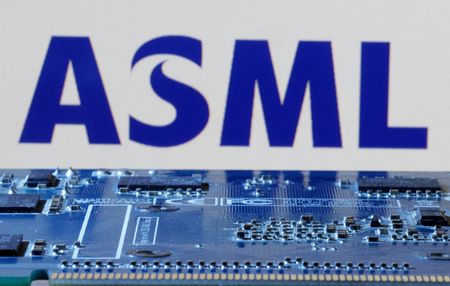By Toby Sterling
ROTTERDAM (Reuters) – A Dutch court on Monday extended the detention of a Russian former employee of semiconductor equipment maker ASML suspected of stealing intellectual property and selling it to buyers in Russia in violation of European sanctions.
The suspect is German Aksenov, a 43-year-old man who has worked for ASML subsidiary Mapper and chip technology company NXP.
He is suspected of stealing design manuals for microchips, microchip equipment and for technology with potential military applications that belonged to ASML, Mapper, NXP and the Delft University of Technology, to which he had access through his employment.
During the initial hearing in the case on Monday, the prosecution said Aksenov took USB sticks with the information to Moscow and gave them to state-owned companies for cash, with the goal of setting up a microchip plant.
Aksenov, who was arrested on Aug. 28 and has been in custody since, denied all charges.
The prosecution asked for his detention to be extended until the next hearing in February, saying there was a risk the suspect might flee and would continue to leak secrets.
The facts alleged would merit a prison sentence of “considerable length”, the prosecution said.
Before the hearing, a spokesperson for ASML said the company was aware of the criminal case.
“In accordance with our policy, we have also filed a complaint ourselves,” the person said.
A spokesperson for NXP said the company was cooperating with authorities. “At this time, we understand the material this person is alleged to have taken from us is not highly sensitive,” the spokesperson said.
Court documents stated that Aksenov had sold the documents for at least 43,900 euros ($46,440), knowing the money was derived from criminal activity, and then concealed the source of the funds he received.
“The defendant made a habit of money laundering,” the document said.
ASML bought Mapper, a Dutch firm, out of bankruptcy for 75 million euros in 2019. That, according to the 2024 book “Focus: The ASML Way”, assuaged concerns in the Dutch government and U.S. military that it would be taken over by a Russian or Chinese buyer.
Mapper was trying to make a lithography product similar to ASML’s, but using electrons rather than light to print the tiny circuitry of chips, a technology known as E-beam.
That product did not succeed but the fast-growing ASML integrated the firm’s 100 engineers into its smaller metrology, or chip-measuring, business.
(Reporting by Toby Sterling. Editing by Ros Russell and Mark Potter)

